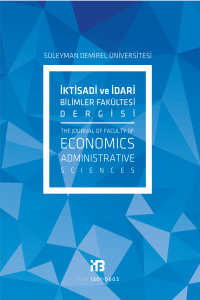ÇOK DÜZLEMLİ AVRUPA BİRLİĞİNDE ÇEVRE POLİTİKASI ENTEGRASYONU ÜZERİNE BİR DEĞERLENDİRME: SEKTÖREL KOORDİNASYON VE BÖLGESELLİK
AB’de çevre politikaları 1970’lerden bu yana ekonomik temeller üzerine sürdürülebilirliğe odaklanan AB çevre politikaları 1990’lardan bu yana AB genişleme politikalarının da etkisiyle çok düzlemli ve çok aktörlü bir karaktere bürünmüştür. AB’nin 2006’da başlatmış olduğu ÇPE (çevre politikası entegrasyonu)ve Çok Düzlemli Yönetişim projesi çevresel politikaların hem kendi içinde hem de sosyal, ekonomik alanlar gibi diğer sektörel alanlarla birleşmesini ve bu yolla da sürdürülebilir kalkınmayı başarmayı hedeflemektedir. Oysa AB’nin idari ve politik yapısı bu entegrasyona karşıt bir zemin oluşturmaktadır; çünkü AB’nin çok aktörlü, düzlemli ve merkezli yapısı içsel entegrasyona izin verse bile sektörler arası koordinasyonu imkânsız kılmaktadır. Buna ek olarak AB’nin yerelleşme ve bölgeselleşme çabaları ulusal hükümetlerle iletişimini koparmakta ve dolayısıyla da politik hiyerarşide kopukluk oluşmaktadır
Anahtar Kelimeler:
Çevre politikası entegrasyonu, çok düzlemli yönetişim, sürdürülebilirlik, sektörel koordinasyon
Çok Düzlemli Avrupa Birliğinde Çevre Politikası Entegrasyonu Üzerine Bir Değerlendirme: Sektörel Koordinasyon ve Bölgesellik
Keywords:
-,
___
- 1. STEINAR, Andresen., The Role of the UN in Global Environmental Governance: Potential for Increased Effectiveness? International Environmental Agreements: Politics, Law and Economics, Special Issue, 7(4): 317-468, 2007.
- 2. BAKER, Susan., The dynamics of European Union biodiversity policy: Interactive, functional and institutional logics, Environmental Politics 12(3): 23-41, 2003.
- 3. BETSILL, Michele M. and BULKELEY, Harriet., ‘Cities and the multilevel governance of global climate change.’ Global Governance 12(2): 141-159, 2006.
- 4. DINGWERTH, Klaus and PATTBERG Philipp, ‘Global governance as a perspective on world politics.’ Global Governance, 12(2), pp. 185- 203, 2006.
- 5. ECKERBERG Katarina and JOAS Mark, ‘Multi-level Environmental Governance: a concept under stress?’, Local Environment 9(5): 405- 412, 2004.
- 6. EUROPEAN ECOFORUM, Background Paper for the Round Table on Environmental Policy Integration at the 5th Environment for Europe Ministerial Conference. Kyiv, May 21-23, 2003.
- 7. FITZMAURICE, Malgosia, International protection of the environment, Recueil des Cours 293, 9-488, 2001.
- 8. GBIKPI, Bernard and GROTE J. R,. From Democratic Government to Participatory Governance, Jürgen R. Grote and Bernard Gbikpi (eds.): Participatory Governance: Political and Social Implications; Opladen: Leske + Budrich, 17-34. 2002
- 9. HERTIN, Julia, and BERKHOUT Frans, Ecological Modernisation and EU Environemntal Policy Integration, Journal of Environmental Policy and Planning, 5 (1):39-56. 2001.
- 10. HOMEYER, Ingmar von): EPIGOV Common Framework, EPIGOV Paper No. 1, Ecologic – Institute for International and European Environmental Policy: Berlin, 2006.
- 11. HOMEYER, Ingmar von and KNOBLAUCH Doris , ‘Environmental Policy Integration and Multi-Level Governance – A State-of-the-Art Report’, EPIGOV Paper No. 31, Ecologic –Institute for International and European Environmental Policy: Berlin, 2008.
- 12. HOOGHE, Liesbet, Cohesion Policy and European Integration:Building Multi-Level Governance, Oxford: Oxford University Press, 1996.
- 13. HOOGHE, Liesbet and MARKS, Garry, ‘Types of Multi-Level Governance’, European Integration online Papers (EIOP) 5(11), 2001.
- 14. HOORNBEEK, John A., ‘Policy-making institutions and water policy outputs in the European Union and the United States: a comparative analysis’ Journal of European Public Policy 11(3): 461-496, 2004.
- 15. IHDP, International Human Dimensions Programme on Global Environmental Change, Institutional Dimensions of Global Environmental Change. Science Plan, IHDP Report 9, Bonn: IHDP, 1999.
- 16. JORDAN, Andrew, Introduction: the construction of a multilevel environmental governance system, Environment and Planning CGovernment and Policy 17(1): 1-17, 1999.
- 17. JORDAN, Andrew, ‘The multi-level politics of European environmental governance: A review article.’ Public Administration 77(3): 662-671, 1999.
- 18. JORGENSEN, Knud E. and ROSAMOND Ben, Europe: Regional Laboratory for a Global Polity?, CSGR Working Paper, No. 71/01, Warwick: Centre for the Study of Globalization and Regionalization, 2001.
- 19. KEATING, Michael, Thirty Years of Territorial Politics, West European Politics, 31(1): 60-81. 2008
- 20. LAFFERTY, William M. and HOVDEN, Eivind, Environmental policy integration: Towards an analytical framework, Environmental Politics 12(3): 1-22, 2003
- 21. LENSCHOW, Andrea, Environmental policy integration: greening sectoral policies in Europe, London, Earthscan, 2002.
- 22. MARKS, Gary and HOOGHE Liesbet, Contrasting Visions of Multilevel Governance, in: Ian Bache and Matthew Flinders (ed.): Multi-level Governance, Oxford: Oxford University Press. 15-30, 2004.
- 23. MCGOLDRICK, Dominic, Sustainable development and human rights: An integrated approach, International and Comparative Law Quarterly 45 (4): 796-818. 1996.
- 24. PETERS, B. Guy and PIERRE, Jon, ‘Multi-level Governance and Democracy:A faustian Bargin'. Multi-level Governance, I. Bache and M. Flinders. Oxford, Oxford. University Pres, 2004.
- 25. ROSENAU, James N., Ernst-Otto CZEMPIEL, Governance Without Government: Order and Change in World Politics, Cambridge: Cambridge University Pres, 1992.
- 26. SABEL, Charles and ZEITLIN Jonathan, Learning from Difference: The New Architecture of Experimentalist Governance in the European Union, European Governance Papers (EUROGOV), http://www.connex-network.org/eurogov/pdf/egp-connex-C-07-02.pdf (20.03.2009).
- 27. SCHMITTER, Philippe C., Democracy in Europe and Europe’s Democratization, Journal of Democracy 14 (4):71-85. 2003.
- 28. SCHOUT, Adriaan and JORDAN, Andrew, Coordinated European governance: Selforganizing or centrally steered? Public Administration, 83(1): 201-220, 2005.
- 29. SIMMONS, Beth A., and MARTIN Lisa L., International organizations and institutions. In Handbook of International Relations, edited by Walter Carlsnaes, Thomas Risse, and Beth A. Simmons, 192-211. London: Sage, 2002.
- 30. WEALE, Albert, PRIDHAM, Geoffrey et al., Environmental Governance in Europe. Oxford, Oxford University Pres, 2000.
- 31. YOUNG, Oran R., KING Leslie A. and SCHROEDER Heike, Institutions and Environmental Change: Principal Findings, Applications, and Research Frontiers. Cambridge, MA: MIT Pres, 2009.
- ISSN: 1301-0603
- Yayın Aralığı: Yılda 3 Sayı
- Başlangıç: 1996
- Yayıncı: Süleyman Demirel Üniversitesi
Sayıdaki Diğer Makaleler
HİSSE SENETLERİNİN KORELASYON UZAKLIKLARINA DAYALI OLARAK KÜMELENMESİ
Arş.gör.sezgin IRMAK, Yrd.doç.dr.koray ÇETİN
Yrd.doç.dr.murat ÇUHADAR, Prof.dr.ibrahim GÜNGÖR, Yrd.doç.dr.ali GÖKSU
Arş.gör.harun SULAK, Doç.dr.abdullah EROĞLU
İZMİR’DEKİ ÜNİVERSİTE ÖĞRENCİLERİ ÜZERİNDE İSTATİSTİKSEL BİR ARAŞTIRMA
Aslı SUNER, Yrd.doç.dr.ali Rıza FİRUZAN, Yrd.doç.dr.yusuf Yüksel AYVAZ
1990’LARDAN GÜNÜMÜZE TÜRKİYE’DE KİTLE TURİZMİNİN GELİŞİMİ VE ALTERNATİF YÖNELİMLER
VERGİ AHLÂKININ SOSYAL VE KÜLTÜREL BELİRLEYENLERİ
Prof.dr.mehmet TOSUNER, Arş.gör.ihsan Cemil DEMİR
İKİ ÖLÇÜTLÜ ZAMANA-BAĞIMLI ÖĞRENME ETKİLİ ÇİZELGELEME PROBLEMİ
